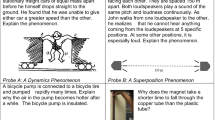Abstract
This research involved naïve physics learners who were interested in majoring in science or engineering. In a semester-long quasi-experimental study, open-ended pretests and weekly interviews were used to analyse the progressive development of students’ conceptions relating to sound and wave motion. Semi-structured interviews were also conducted to elucidate: (1) how their conceptions developed from everyday conceptions to unclear scientific conceptions to scientific conceptions, and (2) their beliefs of physics knowledge. Despite efforts to enable these students to learn physics, the findings showed that only two out of ten students developed acceptable physics conceptions during the course that would enable them to pursue the subject to a higher level. Also, students’ conceptual development was found to be related to their cognitive understanding and to epistemological beliefs of physics. Therefore, to facilitate naïve physics learners’ success in a general physics course, in addition to the acquisition of content knowledge, explicit emphasis needs to be placed on the nature of physics knowledge.
Similar content being viewed by others
References
Anderson, G. (1998). Fundamentals of educational research. London, UK: Routledge.
Bunge, M. (1998). Philosophy of science: From explanation to justification. Science and technology studies. New Brunswick, NJ: Transaction.
diSessa, A. (1985). Learning about knowing. In E. L. Klein (Ed.) Children and computers (pp. 97–124). San Francisco, CA: Jossey-Bass.
Driver, R., Squires, A., Rushworth, P., & Wood-Robinson, V. (1994). Making sense of secondary science: Research into children’s ideas. London, UK: Routledge.
Duit, R., & Treagust, D. F. (1998). Learning in science – From behaviorism towards social constructivism and beyond. In B. Fraser, K, & . Tobin (Eds.) International handbook of science education (pp. 3–25). Dordrecht, The Netherlands: Kluwer.
Elby, A. (2001). Helping physics students learn how to learn. Physics Education Research, American Journal of Physics Supplement, 69(7), S54–S64.
Galili, I., & Lehavi, Y. (2006). Definitions of physical concepts: A study of physics teachers’ knowledge and views. International Journal of Science Education, 28(5), 521–541.
Hammer, D. (1994a). Epistemological beliefs in introductory physics. Cognition and Instruction, 12(2), 151–183.
Hammer, D. (1994b). Student’s beliefs about conceptual knowledge in introductory physics. International Journal of Science Education, 16(4), 385–403.
Hewitt, G. P. (2002). Conceptual physics. San Francisco, CA: Addison Wesley.
Larkin, J. H. (1983). The role of problem representation in physics. In D. Gentner, & A. L. Stevens (Eds.) Mental models (pp. 75–98). Hillsdale, NJ: Lawrence Erlbaum.
Laukenmann, M., Bleicher, M., Fuβ, S., Gläser-Zikuda, M., Mayring, P., & von Rhöneck, C. (2003). An investigation of the influence of emotional factors on learning in physics instruction. International Journal of Science Education, 25(4), 489–507.
Mathison, S. (1988). Why triangulate. Educational Researcher, 17, 13–17.
May, D. B., & Etkina, E. (2002). College physics students’ epistemological self-reflection and its relationship to conceptual learning. American Journal of Physics, 70(12), 1249–1258.
McDermott, L. C. (1990). A perspective on teacher preparation in physics and other sciences: The need for special courses for teachers. American Journal of Physics, 58(8), 734–742.
Merriam, S. B. (1998). Qualitative research and case study application in education. San Francisco, CA: Jossey-Bass.
Norman, D. A. (1983). Some observations on mental models. Hillsdale, NJ: Lawrence Erlbaum.
Pintrich, P. R., Marx, R. W., & Boyle, R. A. (1993). Beyond cold conceptual change: The role of motivational beliefs and classroom contextual factors in the process of conceptual change. Review of Educational Research, 63(2), 167–199.
Qian, G., & Alvermann, D. E. (2000). Relationship between epistemological beliefs and conceptual change learning. Reading & Writing Quarterly, 16, 59–74.
Redish, E. F., Saul, J. M., & Steinberg, R. N. (1998). Students’ expectations in introductory physics. American Journal of Physics, 66(3), 212–224.
Snyder, J. L. (2000). An investigation of the knowledge structures of experts, intermediates and novices in physics. International Journal of Science Education, 22(9), 979–992.
Songer, N. B., & Linn, M. C. (1991). How do students’ views of science influence knowledge integration. Journal of Research in Science Teaching, 28(9), 761–784.
Spall, K., Barrett, S., Stanisstreet, M., Dickson, D., & Boyes, E. (2004). Development of school students’ constructions of biology and physics. International Journal of Science Education, 26(7), 787–803.
van Boxtel, C., Linden, J., & Kanselaar, G. (2000). Collaborative learning tasks and elaboration of conceptual knowledge. Learning and Instruction, 10, 311–330.
Acknowledgement
This research was supported by a Post-Doctoral Research Grant in 2005 from Dankook University in Seoul, Korea to work with Professor David Treagust at the Science and Mathematics Education Centre, Curtin University of Technology.
Author information
Authors and Affiliations
Corresponding author
Rights and permissions
About this article
Cite this article
Chu, HE., Treagust, D.F. & Chandrasegaran, A.L. Naïve Students’ Conceptual Development and Beliefs: The Need for Multiple Analyses to Determine what Contributes to Student Success in a University Introductory Physics Course. Res Sci Educ 38, 111–125 (2008). https://doi.org/10.1007/s11165-007-9068-3
Received:
Accepted:
Published:
Issue Date:
DOI: https://doi.org/10.1007/s11165-007-9068-3




